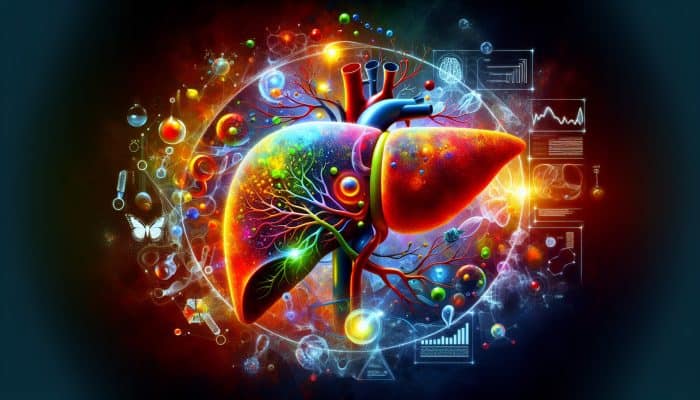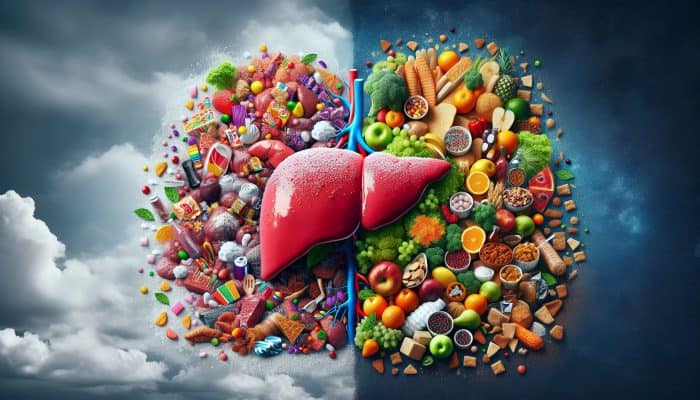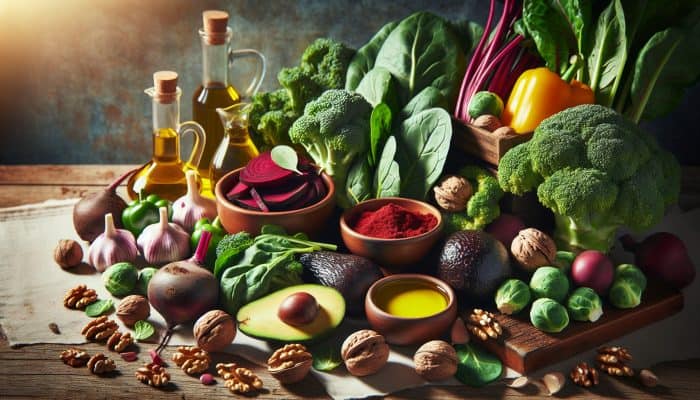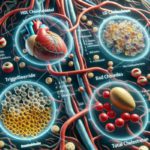Delving Into the Complexities of Liver Detoxification
Unraveling the Liver Detoxification Process: What You Need to Know

The process of liver detoxification is a highly intricate and essential mechanism whereby the liver proficiently removes toxins from the bloodstream, serving a critical role in promoting overall health and wellness. This remarkable organ functions as the body’s primary filtration system, meticulously processing harmful substances to ensure their prompt expulsion. When the liver operates at peak efficiency, it not only shields the body from toxins but also supports vital metabolic functions, enhances immune health, and stabilises energy levels. A thorough understanding of this complex detoxification process is imperative for anyone keen on improving their health through informed dietary and lifestyle choices.
The liver’s detoxification capabilities are indispensable for maintaining optimal health and vitality. It has the remarkable ability to transform toxins into less harmful compounds that can be readily eliminated. This transformation is crucial in preventing the build-up of damaging substances that could lead to serious health complications. Hence, gaining an understanding of the mechanisms behind liver detoxification empowers individuals to make enlightened decisions regarding their nutritional habits and lifestyle choices, ultimately fostering improved liver health and overall well-being.
Exploring the Essential Functions of the Liver in Detoxifying the Body
The liver stands out as an extraordinary organ that plays a pivotal role in filtering blood from the digestive tract. Its primary functions encompass detoxifying various chemicals, metabolising drugs, and processing essential nutrients. Daily, the liver encounters a wide range of toxins from food, environmental pollutants, and metabolic waste. It skilfully differentiates between beneficial nutrients and harmful substances, ensuring that only the beneficial elements are absorbed whilst neutralising and expelling the harmful ones effectively.
This vital filtration process is underpinned by complex biochemical pathways. The liver’s specialised cells, termed hepatocytes, fulfil numerous functions, including converting ammonia into urea, synthesising crucial proteins, and storing essential vitamins and minerals. Through the metabolism of alcohol, medications, and various toxic compounds, the liver plays an integral role in preventing the accumulation of harmful substances in the body, thereby safeguarding overall health and vitality.
Understanding the Mechanisms Behind the Liver Detoxification Process
The intricate liver detoxification process unfolds in two distinct phases: phase one and phase two. In phase one, the liver utilises enzymes to convert fat-soluble toxins into more water-soluble compounds. This initial transformation can occasionally produce reactive intermediates that may be potentially more toxic than the original substances, highlighting the critical importance of transitioning swiftly to phase two.
During phase two, a process known as conjugation occurs, where these reactive intermediates are chemically bonded to another substance (such as glutathione), effectively neutralising them. This crucial phase prepares the toxins for excretion through bile or urine. This dual-phase detoxification system is vital for preserving cellular integrity and overall health. Any dysfunction in either phase can result in a toxic build-up, leading to a range of health problems, including liver disease and dysfunction.
Identifying Factors That Influence the Effectiveness of Liver Detoxification

The efficiency of liver detoxification is influenced by a multitude of factors, including dietary choices, lifestyle habits, and environmental exposures. A diet abundant in processed foods, trans fats, and sugars can overwhelm the liver, significantly compromising its ability to detoxify effectively. Conversely, a well-balanced diet rich in whole foods can enhance liver function by supplying essential nutrients necessary for optimal detoxification processes.
Lifestyle choices play an equally critical role in liver health. Regular physical activity enhances circulation and metabolic efficiency, further bolstering the liver’s detoxification capabilities. On the other hand, chronic alcohol consumption, smoking, and exposure to environmental toxins can severely impair liver function and elevate the risk of liver-related diseases. Additionally, stress levels and sleep quality significantly impact liver health, highlighting the need for a holistic approach to wellness.
Effective Natural Strategies to Enhance Liver Detoxification
Supporting liver health can be significantly achieved through natural methods that bolster its detoxification mechanisms. Prioritising a balanced diet is fundamental; incorporating a variety of liver-friendly foods can greatly enhance the organ’s natural functions. Foods abundant in antioxidants, such as leafy greens, cruciferous vegetables, and berries, can help protect liver cells from oxidative stress and potential damage.
Proper hydration is another essential factor in promoting liver health. Water is vital for flushing toxins from the body, thus enhancing the liver’s efficiency. Moreover, incorporating spices like turmeric, renowned for its anti-inflammatory properties, can support liver detoxification further. Regular consumption of green tea is also beneficial, as it contains antioxidants that may enhance liver function. By implementing these natural strategies, individuals can significantly improve their liver health and optimise detoxification processes.
Expert Recommendations on Nutrition for Enhancing Liver Detoxification
The Best Foods to Support Liver Health and Function

A multitude of foods are well-recognised for their positive impacts on promoting liver health and enhancing detoxification processes. These nutrient-dense options can significantly support the liver in executing its vital functions. A selection of key foods includes:
- Leafy greens (such as spinach and kale)
- Beets, celebrated for their high content of betaine
- Garlic, rich in sulfur compounds that enhance detoxification
- Cruciferous vegetables (like broccoli and Brussels sprouts)
- Avocados, abundant in healthy fats
- Walnuts, which supply omega-3 fatty acids
- Olive oil, a source of healthy monounsaturated fats
- Turmeric, renowned for its anti-inflammatory properties
Incorporating these foods into everyday meals can establish a solid foundation for optimal liver health. Each of these items contributes to various aspects of liver function, from supplying essential vitamins and minerals to enhancing detoxification processes. For instance, leafy greens are rich in chlorophyll, which aids in the elimination of toxins, while beets support bile production, a critical component for fat digestion and detoxification.
How Dietary Choices Directly Impact Liver Detoxification Processes
Diet plays a significant role in liver health and promotes effective detoxification. Specific nutrients are essential for the liver’s ability to process and eliminate toxins efficiently. B vitamins, particularly B6, B12, and folate, are vital for energy production and detoxification pathways. Furthermore, vitamin C acts as a potent antioxidant, neutralising free radicals and protecting liver cells from potential damage.
Conversely, a diet high in refined sugars, unhealthy fats, and artificial additives can severely hinder liver detoxification. Excessive alcohol consumption can lead to fatty liver disease, impairing the liver’s detoxification capabilities. Thus, focusing on whole, nutrient-rich foods is crucial for supporting liver function and promoting overall health. Adopting dietary habits that emphasize fresh fruits, vegetables, whole grains, and lean proteins is essential for optimising liver health and enhancing detoxification processes.
Real-World Examples of Effective Detox Diets You Can Try
Real-world examples of effective diets can provide practical insights for individuals aiming to bolster liver detoxification. One prominent approach is the Mediterranean diet, which emphasises whole foods, healthy fats, and a diverse array of fruits and vegetables. This dietary pattern is rich in antioxidants and healthy fats, which significantly support liver function.
Another excellent example is a plant-based diet, which prioritises legumes, whole grains, nuts, and seeds. Individuals adhering to this eating pattern often report improved energy levels and enhanced detoxification due to their high intake of fibre and essential nutrients. These dietary patterns not only promote liver health but also encourage overall wellness by reducing the risk of chronic diseases. By adopting similar dietary habits, individuals can substantially enhance their liver health and overall quality of life.
Key Nutrients Essential for Optimal Liver Detoxification
Identifying the Key Nutrients Crucial for Supporting Liver Health
Vital nutrients play a significant role in promoting liver health and facilitating detoxification processes. Among these, B vitamins are essential for energy metabolism and supporting the liver’s detoxification pathways. Vitamin C serves as a powerful antioxidant that neutralises free radicals, thereby protecting liver cells from potential harm. Additionally, glutathione, a potent antioxidant produced in the liver, is crucial for detoxifying harmful substances.
Minerals such as zinc and selenium are also vital for liver function, as they assist in enzymatic processes critical for detoxification. Incorporating foods rich in these nutrients is fundamental for maintaining optimal liver health. By understanding the importance of these nutrients, individuals can make informed dietary decisions that bolster their liver’s detoxification capabilities.
The Role of Antioxidants in Improving Liver Detoxification
Antioxidants are essential in protecting liver cells from oxidative damage caused by free radicals. These harmful molecules can accumulate due to metabolic processes, environmental toxins, and poor dietary choices. By neutralising free radicals, antioxidants enhance the liver’s ability to detoxify effectively.
One of the most noteworthy antioxidants is glutathione, produced in the liver and aiding in the neutralisation of toxins. Other antioxidants, particularly those found in fruits and vegetables, play a significant role in maintaining liver health. For instance, berries, citrus fruits, and green leafy vegetables are rich in vitamins and minerals that support the liver’s detoxification processes. A diet abundant in antioxidants not only protects liver cells but also enhances the overall detoxification capacity of this vital organ.
The Importance of Proper Hydration for Optimal Liver Function
Maintaining adequate hydration is crucial for optimal liver function. Water plays a vital role in numerous bodily processes, including the elimination of toxins. The liver requires sufficient water intake to filter and expel waste products effectively. Insufficient hydration can compromise the liver’s detoxification capability, leading to a build-up of harmful substances within the body.
Consuming adequate fluids also aids digestion and nutrient absorption, further supporting the liver’s detoxification efforts. Herbal teas, especially those made with dandelion root or milk thistle, can be particularly beneficial, offering additional support for liver health. By incorporating various hydrating fluids into one’s daily routine, individuals can ensure that their liver operates optimally, facilitating efficient detoxification.
The Role of Amino Acids in Enhancing Liver Detoxification
Amino acids are integral to liver detoxification, with specific amino acids, such as methionine and cysteine, being particularly beneficial. These compounds are precursors to glutathione, one of the liver’s most powerful antioxidants. Maintaining adequate levels of glutathione is essential for detoxifying harmful substances, including heavy metals and environmental toxins.
Methionine is found in protein-rich sources such as fish, poultry, and legumes, while cysteine can be sourced from high-protein foods as well as certain vegetables, including garlic and onions. By ensuring an adequate intake of these amino acids, individuals can enhance their liver’s detoxification processes, ultimately supporting overall health. A diet that includes a variety of protein sources, along with rich antioxidant foods, can significantly boost liver function and detoxification capabilities.
Research-Supported Insights on Nutrition for Liver Detoxification
Current Research Findings on Liver Detox Diets
Research increasingly highlights the impact of specific diets on promoting liver detoxification. Studies reveal that diets abundant in fruits, vegetables, and whole grains positively influence liver function. For instance, the Mediterranean diet has been associated with improved liver enzyme levels and reduced markers of fatty liver disease, clearly establishing a link between nutrition and liver health.
Moreover, certain food groups, especially cruciferous vegetables, have been shown to enhance liver detoxification pathways due to their unique phytochemical profiles. These findings underscore the importance of personalised dietary interventions for individuals aiming to optimise their liver health. By embracing liver-friendly diets, individuals can support their detoxification processes and enhance their overall well-being.
Implementing a Detox Diet: Practical Steps to Consider
Implementing a liver detox diet can be accomplished through several actionable steps. First and foremost, it is essential to prioritise whole, nutrient-dense foods. Focus on incorporating a diverse range of fruits and vegetables into daily meals, aiming for at least five servings a day. Additionally, limit the intake of processed foods, refined sugars, and unhealthy fats, as these can significantly hinder liver function.
Moreover, consider integrating specific liver-supportive foods, such as garlic, turmeric, and beets, into your meals. Drinking sufficient amounts of water throughout the day is crucial for promoting effective detoxification. Herbal teas, like dandelion tea, can also provide additional beneficial effects. Lastly, establishing a routine that includes regular physical activity is vital, as exercise plays an integral role in promoting liver health. By adhering to these steps, individuals can cultivate a nurturing environment for their liver and enhance its detoxification capabilities.
How Supplements Can Enhance Liver Detoxification
Supplements can offer additional support for liver detoxification, particularly when dietary sources may be insufficient. Milk thistle is one of the most extensively researched supplements known for its liver-protective properties. Its active ingredient, silymarin, has been shown to enhance glutathione levels and support liver cell regeneration.
Another notable supplement, N-acetylcysteine (NAC), acts as a precursor for glutathione synthesis and can improve liver function, particularly in cases of acetaminophen toxicity. While these supplements may provide significant benefits, they should always be utilised under the guidance of a healthcare professional. Regular monitoring of liver health through routine checks is essential to ensure that any supplementation aligns with individual health needs and circumstances.
The Impact of Lifestyle Choices on Liver Detoxification
The Dangers of Alcohol Consumption on Liver Health
Excessive alcohol consumption poses a considerable threat to liver health and its detoxification capabilities. The liver metabolises alcohol through a complex process that can result in the accumulation of toxic byproducts. Over time, chronic alcohol intake can lead to conditions such as fatty liver, alcoholic hepatitis, and even cirrhosis, significantly impairing the liver’s ability to detoxify effectively.
Reducing or abstaining from alcohol consumption is critical for individuals seeking to support their liver health. Emphasising a balanced diet rich in antioxidants and maintaining regular physical activity can help mitigate some of the adverse effects of alcohol. By making conscious choices regarding alcohol intake, individuals can considerably enhance their liver function and overall health.
The Role of Exercise in Supporting Liver Health
Regular exercise is vital for maintaining liver health and enhancing detoxification processes. Engaging in physical activity stimulates circulation and metabolic function, assisting the liver in its role of filtering and eliminating toxins. Exercise also promotes weight management, thereby reducing the risk of fatty liver disease, which can compromise liver function and detoxification capabilities.
Moreover, specific forms of exercise, such as cardiovascular workouts and resistance training, can enhance insulin sensitivity and metabolic efficiency, further supporting liver health. By integrating exercise into daily routines, individuals can significantly benefit their liver’s detoxification processes and overall well-being.
The Negative Effects of Smoking on Liver Detoxification
Smoking introduces a multitude of harmful substances into the body, significantly increasing the liver’s workload. The toxins from cigarette smoke can impair liver function and inhibit its detoxification abilities. Over time, chronic smoking can lead to heightened oxidative stress and inflammation, contributing to liver damage and disease.
Quitting smoking is one of the most effective strategies for supporting liver health. By reducing exposure to harmful toxins and prioritising a nutritious diet rich in antioxidants, individuals can improve their liver’s capacity to detoxify effectively. A comprehensive approach that includes smoking cessation, dietary enhancements, and regular exercise can lead to substantial improvements in liver function and overall health.
Understanding the Dietary Impact on Liver Detoxification Mechanisms
A balanced diet rich in whole foods is vital for supporting liver health and its detoxification capabilities. Foods abundant in antioxidants, such as fruits and vegetables, provide critical nutrients that protect liver cells from oxidative stress. Additionally, foods high in fibre, like whole grains and legumes, facilitate the elimination of toxins and support healthy digestion.
Conversely, diets high in processed foods, refined sugars, and unhealthy fats can overwhelm the liver, compromising its ability to detoxify effectively. Emphasising a diet that prioritises fresh, whole foods can optimise liver function, enhance detoxification processes, and improve overall health. By making conscious dietary choices, individuals can significantly impact their liver health and overall well-being.
The Connection Between Sleep and Liver Function
Obtaining adequate sleep is essential for liver health, as it plays a key role in the regeneration of liver cells and supports the body’s natural detoxification processes. During sleep, the body engages in crucial repair and restoration, enabling the liver to perform its detoxification functions efficiently. Chronic sleep deprivation can hinder these processes, leading to an increased risk of liver-related issues.
Establishing a consistent sleep routine is crucial for promoting liver health. Aim for 7-9 hours of quality sleep each night to support the body’s natural rhythms and processes. Prioritising sleep, alongside a balanced diet and regular exercise, creates a holistic approach that enhances liver function and overall well-being.
Effective Strategies for Maximising Liver Detoxification
Daily Habits to Support Liver Health
Incorporating daily habits that support liver health can significantly enhance detoxification processes. Start by prioritising hydration; aim to drink at least two litres of water daily to aid in flushing out toxins. Including herbal teas, such as green tea or dandelion tea, can further promote liver function and overall health.
Adopting a balanced diet rich in whole foods is essential. Focus on consuming a variety of fruits, vegetables, whole grains, and lean proteins. Additionally, engage in regular physical activity to stimulate metabolism and promote detoxification. Establishing a consistent sleep schedule is equally important, as quality sleep plays a crucial role in liver regeneration. By embedding these habits into your daily routine, you can create an environment that fosters liver health and optimal detoxification.
Simple Detox Recipes to Support Liver Function
Simple detox recipes can serve as an excellent means to support liver function and enhance overall health. Consider the following recipes that incorporate liver-friendly ingredients:
- Green Detox Smoothie: Blend spinach, banana, flaxseeds, and almond milk for a nutrient-packed beverage.
- Beet and Quinoa Salad: Combine roasted beets with quinoa, spinach, and a drizzle of olive oil for a vibrant, nutritious dish.
- Garlic-Roasted Vegetables: Roast a medley of carrots, Brussels sprouts, and garlic in olive oil for a delicious side dish.
- Turmeric Golden Milk: Warm almond milk with turmeric, cinnamon, and honey for a soothing drink with anti-inflammatory benefits.
These recipes are not only simple to prepare but also rich in nutrients that support liver health. Incorporating such meals into your diet can enhance your overall well-being and promote efficient detoxification.
The Importance of Regular Health Check-Ups for Liver Function
Regular health check-ups are vital for monitoring liver function and detecting potential issues early. Routine blood tests can assess liver enzyme levels and overall health, providing valuable insights into the liver’s condition. Identifying potential problems early allows for timely interventions that can significantly improve health outcomes.
Encouraging regular health screenings and fostering open discussions with healthcare providers about liver health is crucial. Implementing lifestyle changes, such as a balanced diet and regular exercise, can further support liver function. By prioritising preventive healthcare, individuals can proactively manage their liver health and ensure optimal detoxification capabilities.
Frequently Asked Questions About Liver Health
Recognising Symptoms of Poor Liver Function
Symptoms may include fatigue, jaundice (yellowing of the skin and eyes), abdominal discomfort, and unexplained weight loss.
Are Detox Diets Potentially Harmful to Your Health?
Some detox diets can be extreme and may lead to nutrient deficiencies. It is always advisable to consult with a healthcare professional before starting any detox program.
How Often Should Liver Detoxifications Be Undertaken?
It is generally advisable to support liver health consistently through a balanced diet and lifestyle, rather than relying on intermittent detoxifications.
Are There Specific Foods to Avoid for Optimal Liver Health?
Limit the intake of alcohol, processed foods, refined sugars, and trans fats, as these can significantly impair liver function.
Does Staying Hydrated Truly Improve Liver Function?
Yes, maintaining adequate hydration is crucial for liver function, as it helps flush out toxins and supports metabolic processes.
How Does Chronic Stress Impact Liver Health?
Chronic stress can lead to negative health behaviours and may also contribute to liver inflammation and compromised detoxification processes.
Is It Safe to Use Liver Supplements?
While some liver supplements can be beneficial, they should be taken under the guidance of a healthcare provider to avoid potential interactions and side effects.
What Lifestyle Changes Can Enhance Liver Function?
Focusing on a balanced diet, regular exercise, adequate hydration, and quality sleep can greatly improve liver health and functionality.
Can Weight Loss Benefit Liver Detoxification Processes?
Yes, managing weight can reduce fat accumulation in the liver, thereby enhancing its detoxification capabilities and overall health.
Should I Consider More Frequent Liver Check-Ups as I Age?
Yes, regular check-ups become increasingly important with age to monitor liver health and detect potential issues early.
Connect with us on Facebook!
The Article Nutrition for Liver Detoxification: UK Guide Was First Published On https://acupuncture-frome.co.uk
The Article Liver Detoxification: A Comprehensive Guide for the UK Was Found On https://limitsofstrategy.com

